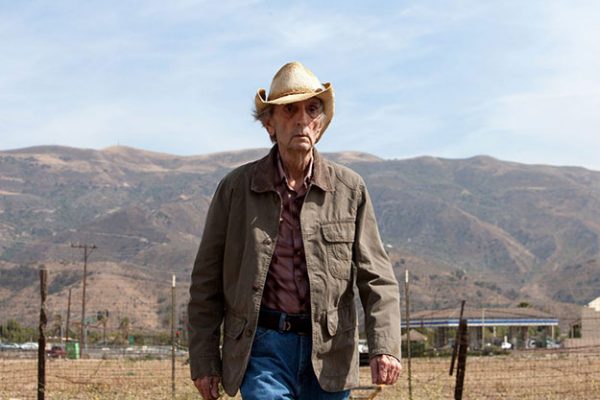@Filmhouse, Edinburgh from Fri 28 Sept 2018
Available on Blu-ray Mon 12 Nov 2018
For fans of the late Harry Dean Stanton, John Carroll Lynch’s directorial debut, Lucky, is a significant moment in cinema history. It was Stanton’s last feature role before he passed away at the age of 91 in September 2017, mere months after the film’s release, and in it he plays a 93 year-old loner, battling existential angst and searching for meaning as he contemplates his own mortality. Reflecting on his career, Stanton had previously discussed his propensity to channel his own personal traumas and dilemmas into his acting, and essentially “play [himself]” in his roles. In the case of Lucky, the truth of this seems unavoidably poignant.
Lucky, the eponymous protagonist, feels like an amalgamation of different roles from throughout Stanton’s career. As well as reflecting biographical elements of the actor’s own life, Lucky feels like a version of Carl Rodd, his character in Twin Peaks, or even an elderly echo of Travis Henderson, Stanton’s break out leading role in Paris, Texas. As an outsider, determined to be self-sufficient, despite his age, and with a committed rebellious streak, Stanton’s trademark weather-beaten expression channels, in turns, taciturn curmudgeon, wry comic and soulful sage. His career as a musician is drawn upon here, too. Fans of Cool Hand Luke, Twin Peaks, or indeed, his musical group, The Harry Dean Stanton Band, will relish another opportunity to hear him singing in one of the film’s most moving and emotional scenes. The performance feels comfortingly familiar, and sure to elicit a decidedly affectionate audience response. It feels like in Lucky, Stanton reached peak Stanton, just in time to give his fans the perfect, zenith version of himself to remember him by.
The supporting cast, a glittering ensemble featuring such notables as Tom Skerritt, Ron Livingston and Ed Begley Jnr are, to a man, excellent. David Lynch aficionados will be charmed and delighted by the bequiffed auteur’s cameo role in the precise way they will expect to be charmed and delighted – namely, by Lynch’s idiosyncratic delivery and characteristic earnest rhapsodising over endearingly quotidian matters. Skerritt is oddly believable as a a military veteran who encounters Lucky, even if his speech is marginally less convincing and understated than the rest of the script.
Lucky is a touching swan song and a triumphant tribute to one of Hollywood’s most universally respected and admired artists.
